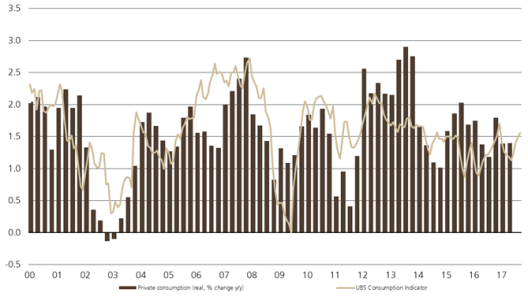The Swiss consumption indicator by UBS shows improvements. The indicator is still distant from the highs in 2012. At the time stronger growth in Emerging Markets and the weaker franc helped the Swiss economy. The UBS consumption indicator rose to 1.56 points in September, signalling consumption growth slightly above the long-term average. The indicator was supported by significantly higher expectations in the retail industry, but UBS still projects consumer spending to grow 1.3 percent for the year overall. Zurich, 25 October 2017 – In September the UBS consumption indicator reached 1.56 points, while the August figure was revised slightly lower to 1.50. The consumption indicator currently shows slightly higher
Topics:
UBS Switzerland AG considers the following as important: Featured, newsletter, Swiss Macro, Switzerland Private Consumption, Switzerland UBS Consumption Indicator, U.S. Consumer Spending
This could be interesting, too:
Nachrichten Ticker - www.finanzen.ch writes Die Performance der Kryptowährungen in KW 9: Das hat sich bei Bitcoin, Ether & Co. getan
Nachrichten Ticker - www.finanzen.ch writes Wer verbirgt sich hinter der Ethereum-Technologie?
Martin Hartmann writes Eine Analyse nach den Lehren von Milton Friedman
Marc Chandler writes March 2025 Monthly
The Swiss consumption indicator by UBS shows improvements. The indicator is still distant from the highs in 2012. At the time stronger growth in Emerging Markets and the weaker franc helped the Swiss economy.
The UBS consumption indicator rose to 1.56 points in September, signalling consumption growth slightly above the long-term average. The indicator was supported by significantly higher expectations in the retail industry, but UBS still projects consumer spending to grow 1.3 percent for the year overall.
Zurich, 25 October 2017 – In September the UBS consumption indicator reached 1.56 points, while the August figure was revised slightly lower to 1.50. The consumption indicator currently shows slightly higher consumption growth than was forecast for the year overall by UBS Chief Investment Office Wealth Management. Due to weak employment growth in the first six months and the rise in inflation, consumption is only expected to increase 1.3 percent this year.
Private consumption vs. UBS Consumption IndicatorThe indicator reflected improved expectations in the retail industry in September. The estimate for the business climate in the retail industry from the ETH Zurich Swiss Economic Institute crept into positive territory for the first time since January 2015. On average, expectations have been at -9 points since the Swiss franc’s exchange rate floor against the euro was abolished. Thanks to the franc’s devaluation against the euro in the last few months, the price competitiveness of Swiss retailers has improved, which has in turn boosted the mood of retailers. Otherwise, no clear trend is recognizable for the indicator’s other components. While the number of hotel stays by Swiss guests in the figures published in August was 1 percent higher than in the previous year, new registrations for passenger cars fell 6 percent in September. |
Switzerland Private Consumption and UBS Consumption Indicator, September 2017(see more posts on Switzerland Private Consumption, Switzerland UBS Consumption Indicator, ) Source: ubs.com - Click to enlarge |
How the UBS Consumption Indicator is calculated
The UBS Consumption Indicator signals private consumption trends in Switzerland with a lead time of one to three months on the official figures. At more than 50%, private consumption is by far the most important component of Swiss GDP. UBS calculates this leading indicator from six consumer-related parameters: new car registrations, business activity in the retail sector, the number of domestic overnight hotel stays by Swiss residents, the consumer sentiment index, employment figures and credit card transactions made via UBS at points of sale in Switzerland. With the exception of the consumer sentiment index and employment figures, all of this data is available monthly.
Tags: Featured,newsletter,Switzerland Private Consumption,Switzerland UBS Consumption Indicator,U.S. Consumer Spending
